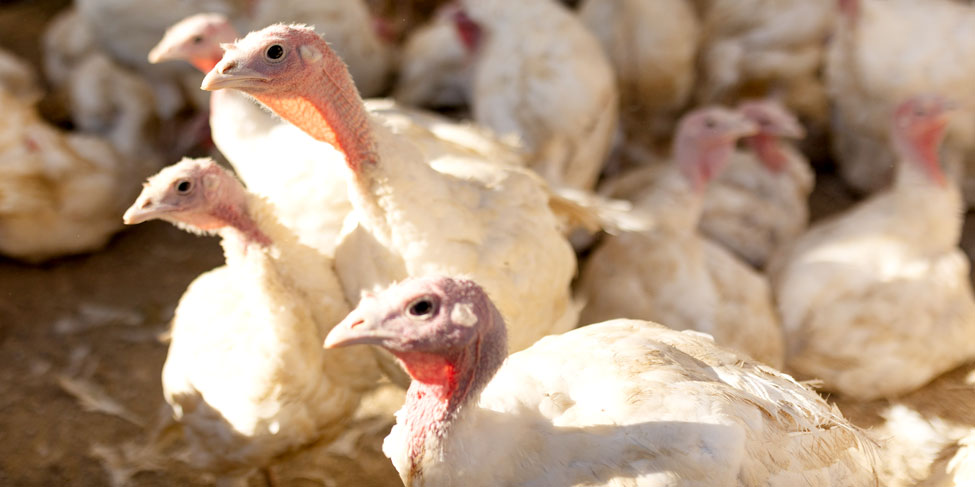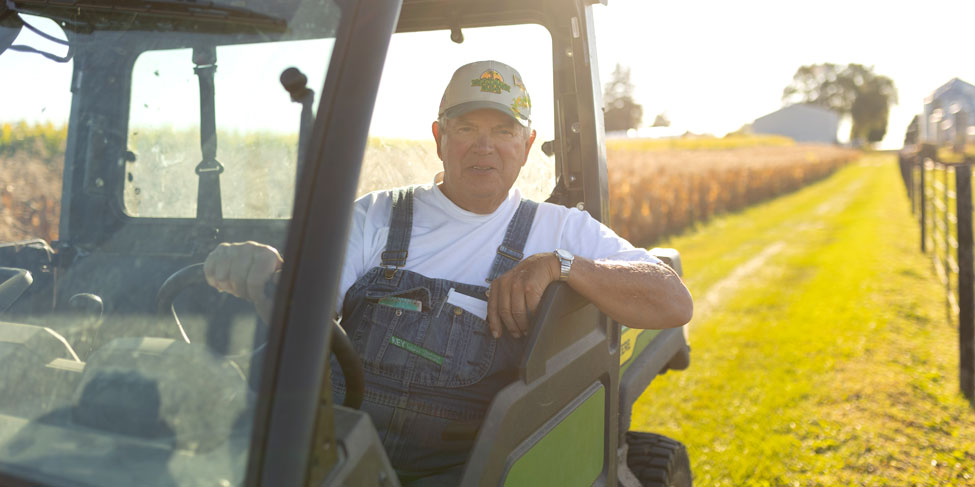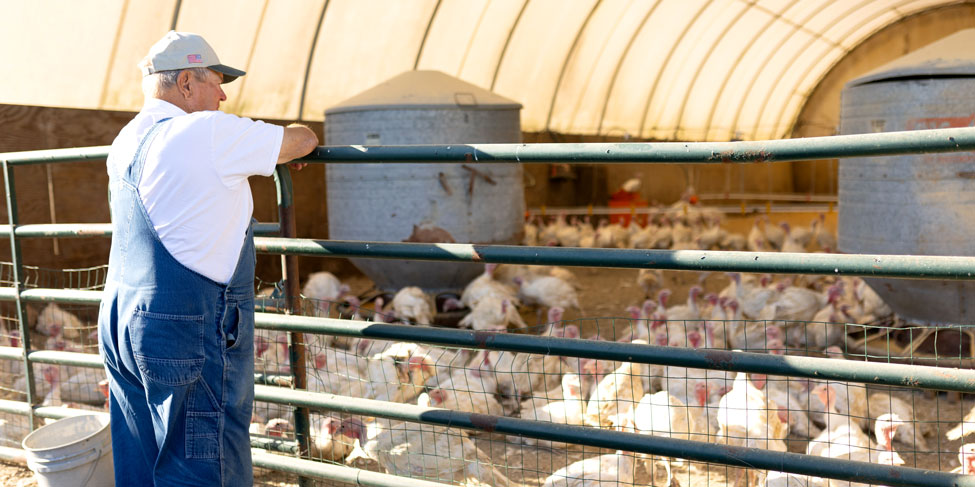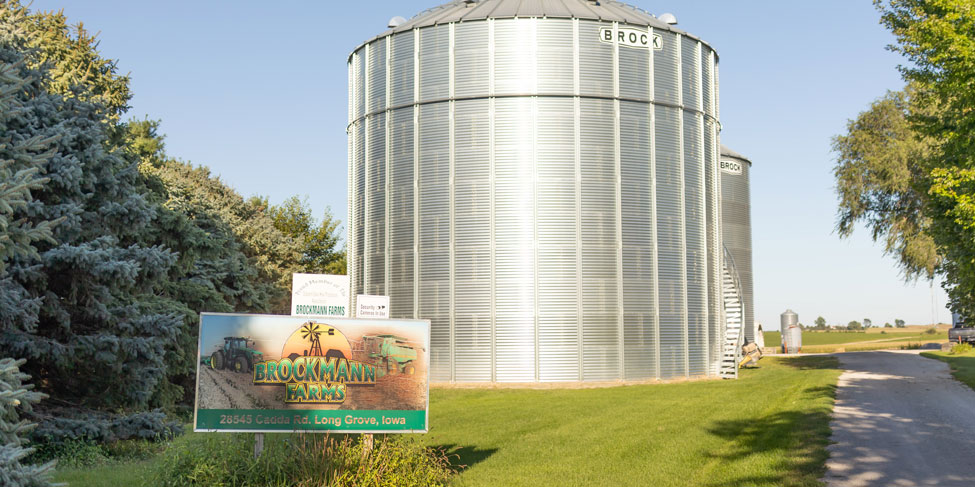Birds Of A Feather
September 11, 2024
By Gretchen Westdal Centers
If you do a quick search for Brockmann Farms on the internet, your results will be few. That’s no accident. Chuck Brockmann, the 82-year-old farmer who owns and runs the operation, does things old school. He knows what he likes and isn’t afraid of some work. Brockmann raises turkeys. Now, in Iowa, that isn’t exactly uncommon — Iowa ranks No. 7 in the country in turkey farming — what’s interesting is how things are done at Brockmann farm. And it can be heard from afar.
Pulling up to the farm, located in Long Grove, you’ll hear music. Loud music.
“I have the radio on full time,” Brockmann explains. “You can hear it all over my place. It keeps the predators away.”
 Brockmann raises turkeys just for the Thanksgiving holiday and has been doing so for more than 30 years. Selling his fresh, never-frozen turkeys for one of America’s favorite holidays is something he prides himself on. He also does smoked turkeys. His operation is unique from the vast majority of other turkey farmers who raise their poults to be processed into deli meats and various types of sausage.
Brockmann raises turkeys just for the Thanksgiving holiday and has been doing so for more than 30 years. Selling his fresh, never-frozen turkeys for one of America’s favorite holidays is something he prides himself on. He also does smoked turkeys. His operation is unique from the vast majority of other turkey farmers who raise their poults to be processed into deli meats and various types of sausage.
He has more than 400 turkeys he cares for, and he has customers waiting for those birds come November. To make sure his flock is protected from predators, he’s gotten creative in his methods. Though, it would seem the turkeys might also have opinions on how they’re cared for.
“This year, the turkeys decided to jump on the radio and roost on it,” laughs Brockmann. “They turned the dial and eliminated the station.”
The peace the turkeys longed for is not something that Brockmann needs in his life. After retiring from a long career that spanned farming, the armed services, education, manufacturing and concluding at John Deere, Brockmann needed something to stay busy. And as many Iowa farmers know, you don’t really stop once you start.
 “I started with about a half dozen turkeys, and we processed them ourselves,” Brockmann explains.
“I started with about a half dozen turkeys, and we processed them ourselves,” Brockmann explains.
What started as a hobby, raising a few poults, processing them himself, and selling them to a few friends before the Thanksgiving holiday, turned into something much bigger. Now, word about “Chuck Turkeys” and his orders have grown.
With the growth in orders, challenges have grown, too. From rising feed and farm equipment costs to fewer processing facilities nearby, Brockmann wonders how much longer he’ll farm — the thing outside his family that has sustained him all his life.
It’s a big enough challenge to get his turkeys up to the processing plant in Greene, nearly three hours away. On processing day, he wakes up at 2 a.m. to start the trek up and back. He makes the trip a total of six times—three trips up to drop the live turkeys and three trips back with his product. And now, the fate of the Greene processing plant hangs in the balance. Brockmann notes that he knows their ability to process as many birds has gone down due to labor shortage, and now, it looks like it may close altogether.
Help via the Iowa Turkey Federation
The Iowa Turkey Federation knows this struggle well since they represent the interests of all Iowa turkey farmers — both large-scale and smaller operations. The Iowa Turkey Federation supports Iowa turkey farmers by advocating for their interests, providing educational resources and promoting the turkey industry within the state. The organization works to ensure the sustainability and profitability of turkey farming by offering guidance on best practices and representing farmers in policy discussions. Policy discussions and representation at state and national levels are crucial for farmers like Brockmann.
Poultry processing in the U.S. differs from beef, pork or lamb. Those meats, which are all considered red meats, can do custom processing at large and small facilities. The USDA oversees poultry processing and has stringent guidelines on handling the meat.
“When you start looking at small turkey processors in Iowa, there aren’t that many,” explains Gretta Irwin, executive director and home economist for the Iowa Turkey Federation. “Understanding the difference between federally inspected and state inspected operations and the differences across how beef, pork, lamb and turkey are raised and processed is important.”
Since red meat processors can do both custom and inspected processing at the same facility, there is greater flexibility for those commodity groups to meet producer and customer needs. Currently, small poultry processors are forced to commit to either doing everything under inspection or operating under custom and another exemption, which can present a challenge.
But the Iowa Turkey Federation and Congressman Randy Feenstra hope to change that at a federal level. In August, Feenstra introduced the “Increasing Small-Scale Poultry Processing Opportunities Act” to the U.S. House of Representatives. This would revise the Poultry Products Inspection Act to allow small, custom poultry processing facilities the option to process under inspection when needed to meet their client needs.
“I’ve met with poultry producers frustrated by the lack of convenient processing options in our communities and small businesses ready to grow their operations. Due to outdated laws, Iowa farmers often travel long distances to have their broilers and turkeys slaughtered and processed — this must change,” said Congressman Feenstra in a press release. “To help expand options, increase demand and secure flexibility for our poultry producers, I introduced legislation to modernize federal law and increase small-scale poultry processing in Iowa.”
 Looking to the future
Looking to the future
The proposed legislation would help operations like Brockmann Farms, making it easier for small-scale poultry farmers to connect with their consumers. The connection is one of the things that Chuck Brockmann loves about his work. Meeting with people, talking with them and connecting them to a delicious product and a way of life. But he knows time marches on, and there are things he can’t control — that’s farming.
Brockmann takes it all in stride. The years of experience and the ups and downs of the industry can’t ruffle his feathers, but he does wonder who will take the farm over and what the future holds. He and his wife, Kim, have seven children — all of whom have their careers and pursuits. He wants the farm to be in good hands and has even connected with the Scott County FFA chapter to put feelers out to see if a young farmer may want to take over.
He asks, “You know anyone interested in turkey farming?” If anyone out there does, knowing the Iowa Turkey Federation is here to support, they should head over to Long Grove.
